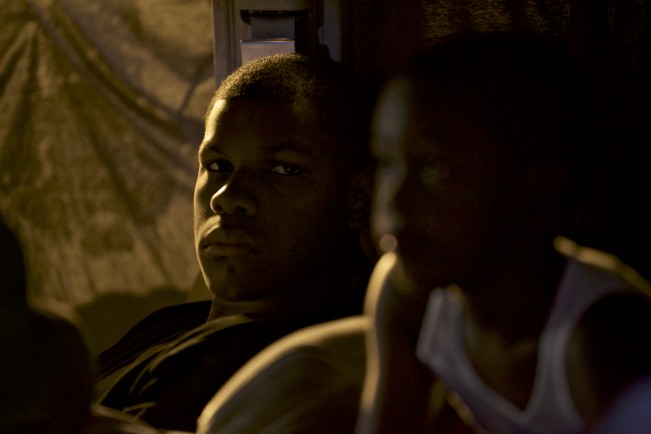

By Kim Voynar Voynar@moviecitynews.com
Sundance 2014 Review: Imperial Dreams
First time feature director Malik Vitthal channels the ebb and flow of hope and despair in his powerful feature film debut Imperial Dreams. The film tells the story of Bambi (John Boyega, who’s simply terrific here), a young man just released from prison who returns home to South Central Los Angeles intent upon creating a better life for himself and his young son, only to find he must fight against the tide of his family and friends, who expect him to dive back in to the life of crime in which he was raised.
Bambi wants desperately to be a writer; having had a piece published in McSweeney’s from prison, he finds his dream is within reach, if only he can find a way to survive long enough to see it come to fruition. When he arrives at the home of his Uncle Shrimp (Glenn Plummer), who raised him to be a “soldier” on the streets of South Central in the absence of his crackhead mother, he finds little appreciation or support for his literary ambitions. Instead, Bambi walks straight back into a world where his four-year-old son, Day (played by twins Ethan and Justin Coach) plays unsupervised while Bambi’s mother Tanya (Kellita Smith) lies passed out on the floor, and his uncle greets him by trying to put a gun back in his hand. In Shrimp’s worldview, gratitude means you do what he says and don’t question; he wants Bambi to drive an illegal load to Portland for a tempting amount of cash, and saying “no” isn’t an option.
Day’s mother Samaara (Keke Palmer) is sitting in LA County Jail, leaving Bambi as a single dad struggling to support his son and stay on the straight and narrow, while running up against obstacles at every turn. The cops who patrol his ‘hood lock on to him from the minute he returns, tailing him everywhere in their attempt to find his cousin Gideon (De’Aundre Bonds), a suspect in the accidental gang-related shooting of a 10-year-old. Bambi’s parole officer demands that he find a legit job immediately lest he lose his get-out-of-jail free card, but Bambi can’t get a job without a valid driver license. He can’t get a license because the state has claim on a $1500 past due child support bill … which he couldn’t pay from prison, and can’t pay off now without a job. It’s the classic Catch 22 of the urban poor: the struggle of a young man who wants to live a clean life, juxtaposed against the reality of a world which sees him only as a young black man with a record who will never be anything more than a street thug. Bambi’s younger brother Wayne (Rotimi Akinosho), meanwhile, faces his own struggles and temptation to dabble in the criminal world for profit; he’s earned a partial scholarship to business school, but needs to raise $3000 fast to pay for what the scholarship won’t cover, or watch his own dreams of a better life slip through his fingers.
While the story Vitthal and his co-writer Ismet Prcic tell is Bambi’s, the obstacles their protagonist finds himself facing could be that of any young person growing up poor in the projects, where options are limited, hope a pipe dream, and the possibility of rising above it all a brass ring that feels forever just out of reach. When our justice system is largely a revolving door that sends people of color to jail at a disproportionate rate with little or no focus on rehabilitation and rebuilding, how surprising is it that the recidivism rate for parolees makes it more likely that someone getting out of prison will land back there eventually than succeed in making a fresh start? Bambi’s story is something we in our cozy middle class lives maybe prefer not to think about too hard when we ponder the abstract idea of projects and prison terms. The real plight of poverty is the disparity of opportunity, and the way in which we blame those born into an urban war zone for growing up in a way that enables them to survive in it. It’s nature versus nurture: How do we expect a kid with the potential to do something amazing with his life to navigate his way there with no support system save for the friends and relatives who have him working the corner and holding a gun in his hand from childhood? When going out of the house means you might be dodging bullets at the bus stop, or seeing the lifeblood seep out of someone you know onto the pavement? What do we see when we see a young Black man like Bambi? Do we see only the thug he was raised to be, or the artist struggling to break free of circumstance to be more?
Vitthal paints a grim picture, but he closes his tale by leaving us, and Bambi, with a glimmer of hope for his future, and the possibility that the power of his spirit and determination might just help him rise above his life after all. Imperial Dreams is gut-wrenching and often bleak, and no doubt there will be those who will label it as white-guilt-inducing poverty porn; I would argue, though, that if watching Bambi’s story unfold causes a twinge of liberal white guilt in your gut, rather than blaming the film and the filmmaker, you should consider the possibility that it makes you feel uncomfortable because its truths are resonating in a way you don’t want to examine too closely. And then consider the radical idea that maybe we need to be spending more on investing in keeping kids in the projects from growing up to become criminals in the first place, rather than building more prison cells to house them once they do.















